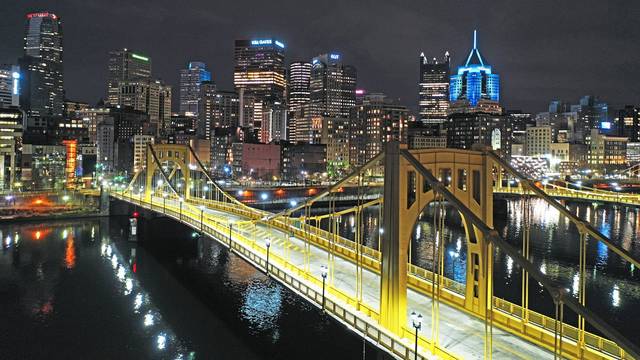During my time as city controller, I’ve expressed concern about Pittsburgh’s “infrastructure deficit” — the repairs and improvements we should be making to our roads, bridges, wastewater systems and other critical infrastructure compared to what we actually complete each year.
Consider this: Pittsburgh has nearly 1,000 miles of paved roads in the city. Assuming asphalt lasts for about 15 years, the city would need to pave at least 60 miles annually to maintain them.
Yet based on the Department of Mobility and Infrastructure’s 2021 street resurfacing schedule, only 34 miles are scheduled to be paved this year. Over time, the deferred maintenance leaves us with a backlog of work while residents and visitors to the city are left to deal with deteriorating roads. Over half of the city’s paved roads have the lowest possible rating, meaning they are in immediate need of repair.
The biggest challenge in the next two decades will be fixing our underground wastewater system. Some of these sewer lines were built in the 1840s, and approximately one-third of the sewer system is at least 110 years old. We rely on it to keep our rivers clean and drinking water safe, but the maintenance backlog built up over time has meant more frequent water main breaks, which impact homes, businesses and schools.
Pittsburgh’s physical infrastructure includes 446 bridges, 866 linear miles of city streets, 23 miles of steps, 276 miles of public sidewalks and countless miles of water lines. The Bipartisan Infrastructure Investment and Jobs Act brokered by President Biden and members of both parties in the Senate is historic. It represents the largest infrastructure revitalization effort since the creation of the Interstate Highway System in 1956 and commits a total of $550 billion in new funds to our communal public infrastructure.
This money will go toward roads and bridges, of course, but also storm and wastewater management, clean drinking water and lead pipe replacement, high-speed broadband internet, modernizing the electrical grid, improving public transit (including Amtrak), and making clean energy investments needed to build resiliency to combat the climate crisis.
This funding will improve everyday conditions for all local residents. The Economic Policy Institute estimates that every $100 billion in infrastructure spending creates around 1 million new jobs and boosts private-sector output. According to the Biden administration‘s estimates, this bill will create 2 million jobs annually, many here in Pittsburgh, which would boost household incomes and stimulate the local economy.
Allegheny County has the most structurally deficient bridges of any in the country, and the $1.6 billion Pennsylvania would receive for bridge improvements would go a long way toward making sure those critical routes stay open and safe for years to come. These bridges and highways connect people to schools, hospitals and employment, and are vital to the region’s economy.
The legislation also dedicates a historic $55 billion toward replacing all lead pipes and service lines, ensuring that the work the Pittsburgh Water and Sewer Authority has already started is finished and leaves no school or household behind.
With another $5 billion giving school districts an opportunity to replace diesel-fueled busses with zero-carbon and low-carbon alternatives, we would see lower instances of asthma and other health problems among school children. This will make progress in efforts to achieve environmental equity while creating a more robust market for American-made batteries and vehicles.
If Pennsylvania receives its allotment of $2.8 billion to modernize local public transit, we could finally invest considerable resources to the East Busway and connect even more underserved neighborhoods to a reliable and fast route to downtown Pittsburgh. Using grant funding from the EPA, the Port Authority has already taken steps to add electric busses and charging stations to its fleet. The new federal funding for transit would allow it to expand that effort and reduce its carbon footprint. And with $7.5 billion in funding to build out a national network of electric vehicle charging stations, consumers would be given a cost-efficient and practical alternative to gas-powered vehicles.
While we talk about infrastructure as a physical investment, we shouldn’t forget that ultimately this is an investment in people’s health, safety and well-being. Creating jobs and building a better quality of life for our communities is a worthwhile endeavor.
This bill will make a once-in-a-lifetime investment into our public infrastructure and will benefit Western Pennsylvania tremendously. I look forward to seeing the president sign this landmark legislation and encourage Congress to fulfill the rest of the Biden administration’s economic agenda in the coming months.
Michael Lamb is the city controller for the City of Pittsburgh. Independently elected citywide, the controller is the fiscal watchdog for the City of Pittsburgh.


